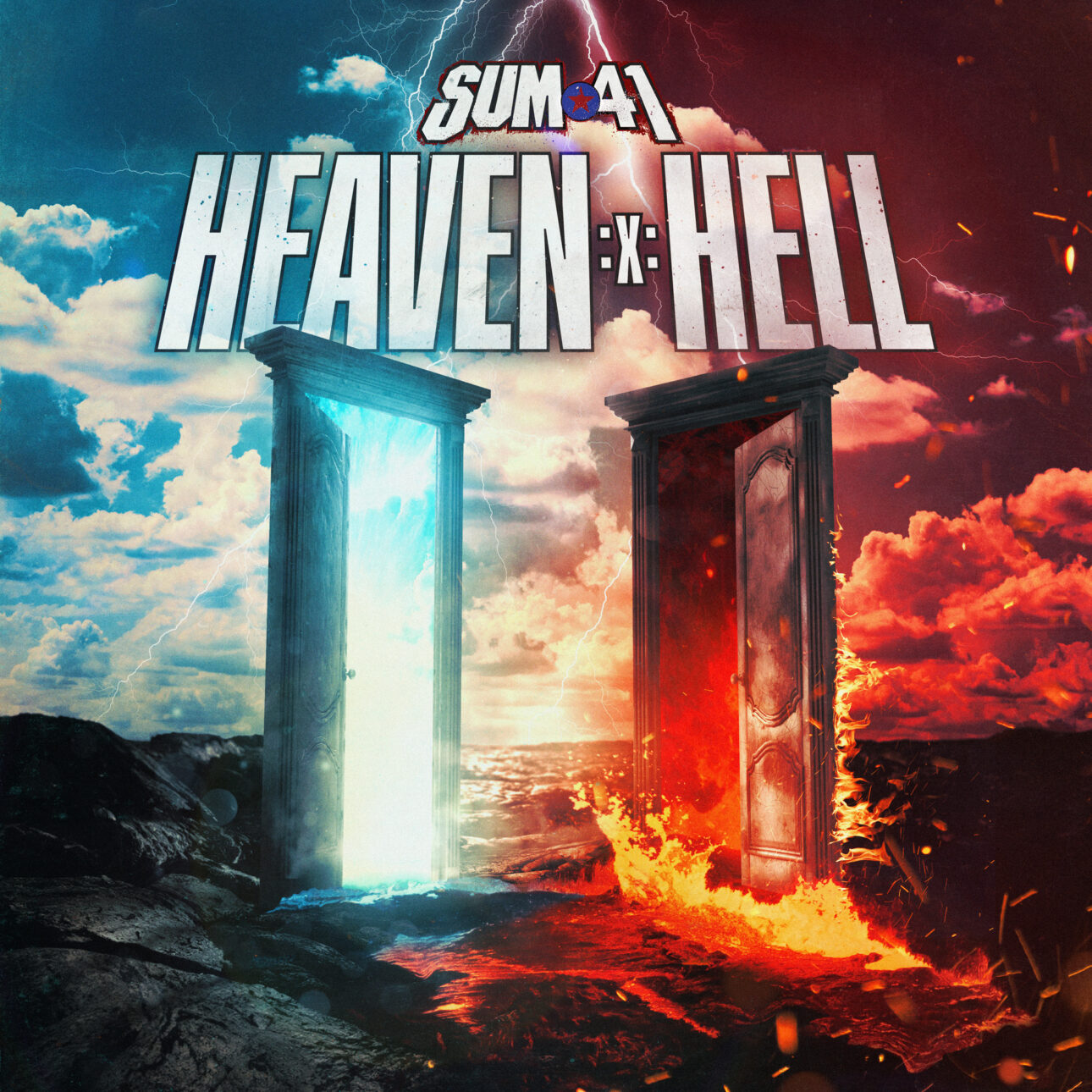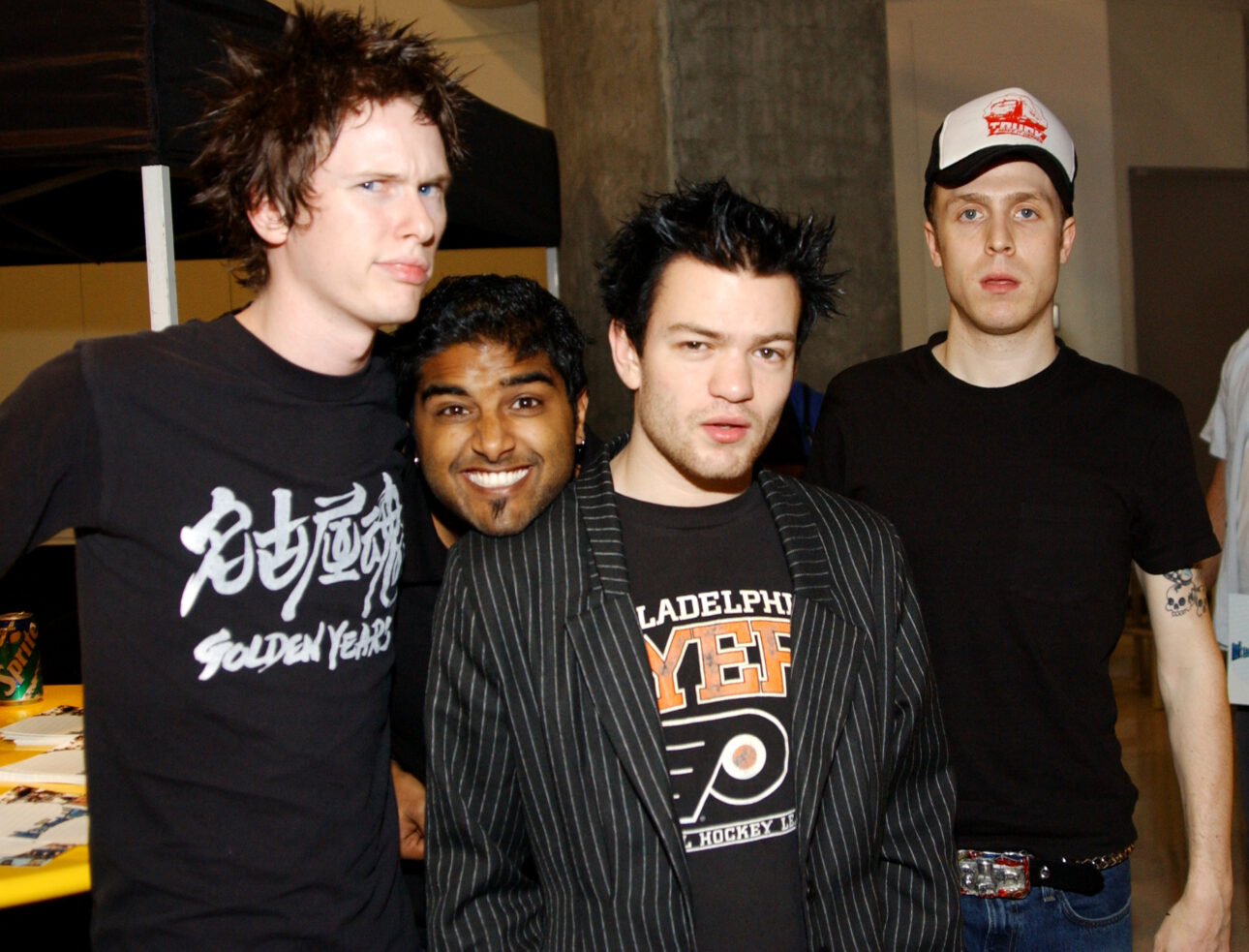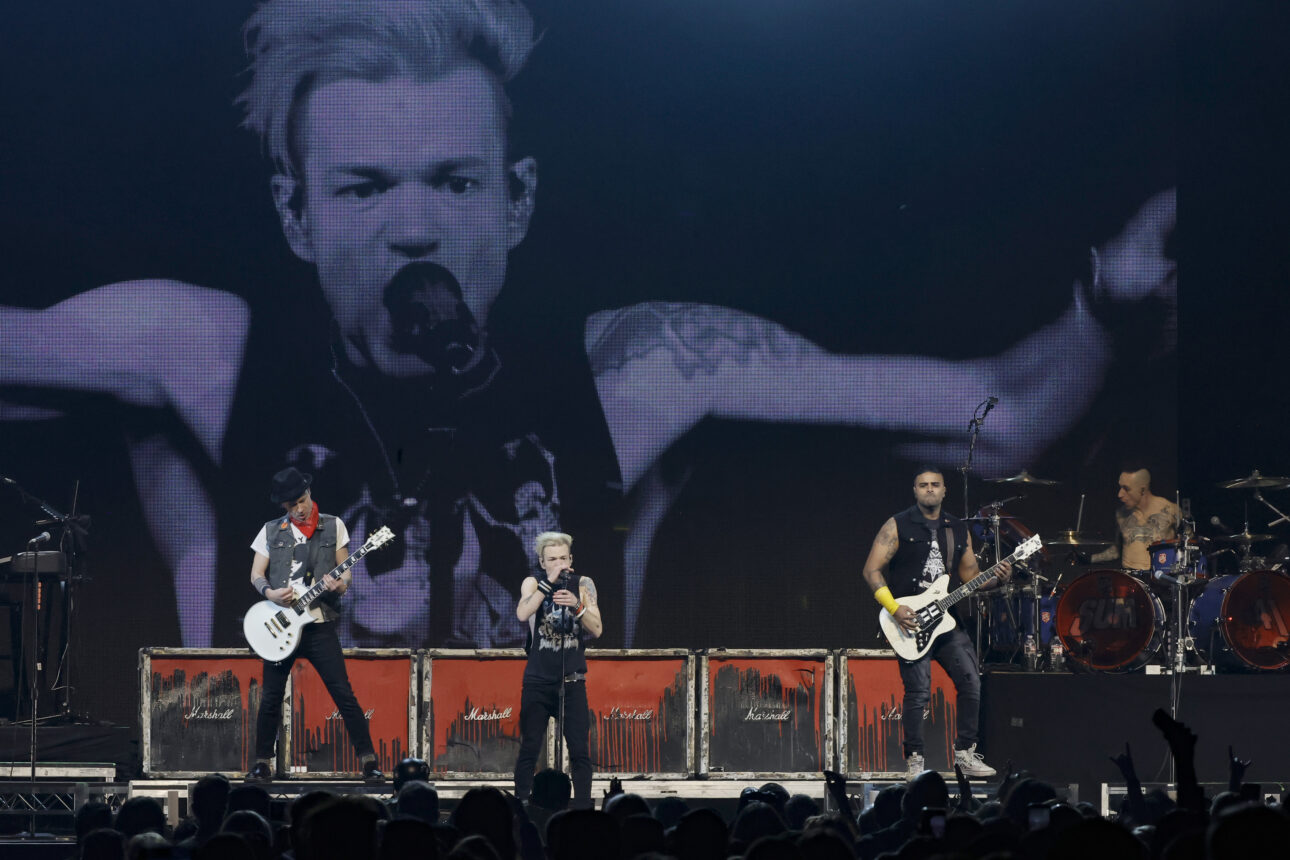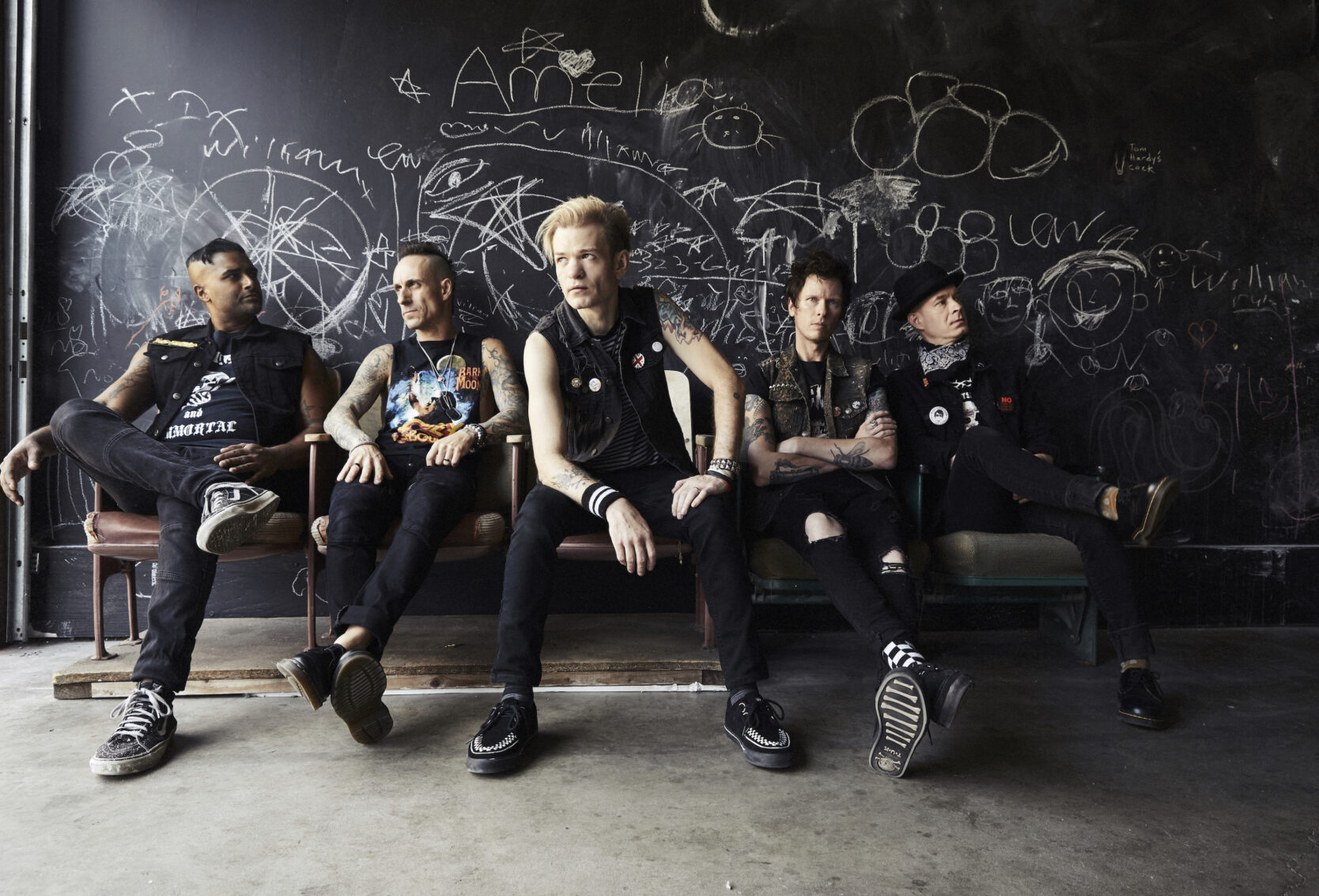“I didn’t go into this album thinking this would be the last one,” Sum 41’s Deryck Whibley says about Heaven :x: Hell, an ambitious double album of 10 pop-punk songs and 10 metal songs, which conclude a wild ride that began in the unassuming community of Ajax, Ontario.
“Once it was all done and I sat back and listened to it, I felt now’s the time—this is a good final record. It just said to me that this is the last one and a good time to leave it.”
Twenty-seven years after forming, the band is breaking up. They leave behind a legacy of an infectious blend of melody, metal, and accessible, evocative imagery.
And it can all be traced back to an unforgettable day as young fans at a traveling punk music festival. “NOFX, Pennywise, and Warped Tour,” Deryck recalls clearly. “We went, and that was the day when we decided we needed to be a band like this.”

This epiphany took them beyond the Warped Tour and into mainstream culture, with millions of records sold and a long list of hit singles and great songs.
“That Warped Tour I mentioned? It’s almost 30 years ago, and ever since that day and from that moment, all I’ve ever thought about, from the second I wake up until I go to bed, is Sum 41,” he reflects.
But then he adds: “It just got to a point where I started feeling, ‘Is this all I have to offer? Is this all I’m ever going to do?’ I had other thoughts and other ideas but always buried them because I’d say, ‘Stop thinking about that. You’re in Sum 41. This is all you’re going to do.’ So, as much as I love it and as amazing as it has been—even the low points, because there’s been a lot of ups and downs—I fear that if I keep doing the same thing over and over again, I will start to hate it. I love it now, and that’s how I want it to end.”
He chooses “Still Waiting,” from their second record, Does This Look Infected?, as the band’s most iconic song.
Which came first, the lyrics or the melody?
For me, it’s always a riff and a bit of a melody first, with the words usually later, and that’s for every song. Sometimes I’ll get a line or two, and that was the case for “Still Waiting” where I wrote the chorus, “So am I still waiting, for this world to stop hating?” That came out right away, and it took a little while to write the rest of the song. It was relatively quick in the grand scheme of things, but it felt like it was taking forever because it was the last song written for Does This Look Infected? The whole record was pretty much ready to go: We had picked the first single, everything was moving ahead, and at the last second, I wrote “Still Waiting.” I knew right away that there was something about it. I felt this song could have been the first single, but it wasn’t finished yet—everybody heard my little demo and thought, ‘There’s something special there, but you’ve got to try to finish it.’ And even though it took another, maybe, two weeks, it felt like forever because I was working on it non-stop, trying to get it done on time.

When you wrote this song, you had just experienced a lot of success with All Killer No Filler. Was there a lot of pressure at the time?
Oh yeah, a ton of pressure because we were following up our first record that did really well and sold a lot, and the worst part about it was while we were on the road for the All Killer tour, there was already talk of the next record. I didn’t have any songs yet, and our schedule was just so crazy back then—we were so young [that] we didn’t know we had any kind of say and we just got handed schedules.
So we’d get a schedule that said we’d get a break in May and we’re going to take a few weeks to write, and then you’re going to start recording in June, and then you’re on the Reading Leeds Festival in August, and you start touring mid-August, and the rest of the year is all booked. And the release date for the record is going to be in November or something like that. And I’m thinking, “Okay, you’re giving me how many weeks to write? And you’re giving me how many weeks to record?” It ended up being, like, 10 weeks total to write and record this record. I just freaked out. I was like, “I don’t know how you expect me to do this.” I mean, our first record took me a year and a half to write, and now you’re giving me a few weeks to write a follow-up to this record. (Laughs.)
At the last second, when I thought I was done and everybody was like, “Okay, great, ‘Hell Song’ is going to be the first single,” for some reason, I picked up the guitar and started writing “Still Waiting.” I was like, “Aw fuck, here’s a song that could be the first single and I have to finish writing it.” Just when I thought it was all over.
It was just the chorus, a little bit of the riff, and I thought, “Man, I think this is actually kind of good. I should show this to the rest of the guys,” and when I did, right away they were like, “That’s the best song off the record, so you got to finish,” and I was like, “Aw, man.”
Is the song about George Bush and the Iraq War?
Yes, the war hadn’t started yet, but soon after 9-11, his whole pitch didn’t seem right—you’re going into Afghanistan, but also going after Saddam Hussein. Like, what’s going on? … It all felt weird. We didn’t know much about politics—we’re just 21-year-old Canadians, but even we thought it felt like bullshit. So that was on my mind, and it came out in that song. When I write songs, I don’t really think of a topic before I start writing. I start writing words and I let whatever comes out inform me what’s going on; it usually just comes from my subconscious, I’m assuming.

Was this your first foray into political songwriting?
That record has a couple of songs that sort of lean into politics, but yeah, it was. It was only our second record, so it’s not like we had this big body of work, and we were still figuring out who we were. And then when you go out on the road, you start to realize that there’s a whole big world out there, and we’d only seen Toronto up until that point. And a lot of times, traveling around the world in those days, the only channels you could watch in English are CNN and MTV, so you’re bouncing between the news and music videos. You start paying attention to things a little more. We didn’t know a lot, but it was really in your face, and we were starting to form some strong opinions.
Was shooting the video fun?
We had this idea for a “record company” guy who comes in and says all the metal bands are over, and it’s all about the Strokes and the Hives and the White Stripes because that was the explosion at that time. And we thought it was kind of funny but weren’t fully into it and were going to think of some other ideas.
Remember I said they booked us for [the] Reading and Leeds Festival in August? When we went over there, the Strokes were playing it as well. We were staying at the same hotel, and we’d hung out with those guys enough at that point that as soon as we saw each other in the lobby, we were like, “Oh shit, let’s hang out” and we ended up staying up all night—we used to stay at this hotel in London that has a 24-hour bar. Any time, day or night, there’s always a bartender. It was probably about 9:00 a.m., and it was only Julian [Casablancas, lead vocalist of the Strokes] and I sitting at this bar, still up, talking about whatever, solving the world’s problems, and I pitched him our idea for the video.
He thought it was amazing. His reaction was so great that we had to do it.





